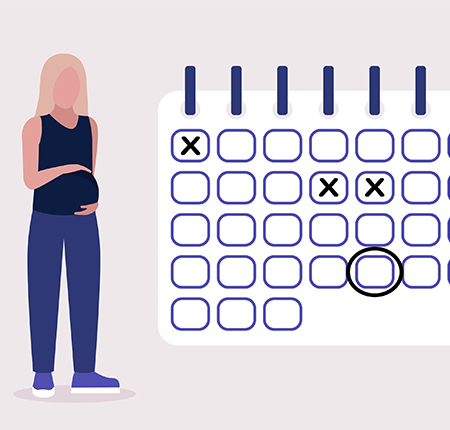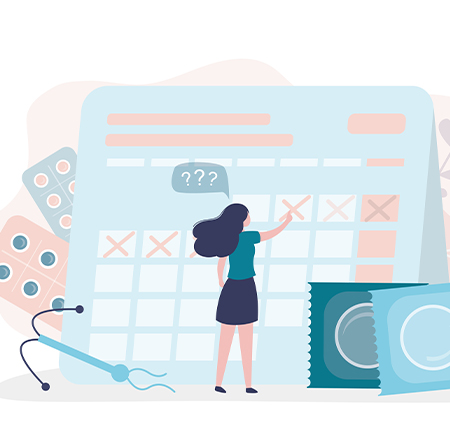
Menstruation delay: one of the situations when we get excited or, on the contrary, immediately alarmed, then many times we realize that it was not a pregnancy.
Indeed, a delay in menstruation is among the first signs of pregnancy, but it can also be caused by stress, eating disorders or other health problems. What does such a delay mean, how long does it last, what are the causes and what can you do to find your period balance, we talk about everything that bothers you about the delay of menstruation.
What does it mean when your period is late?
As the name suggests, a missed period occurs when your menstrual cycle is longer than normal and bleeding is delayed.
The menstrual cycle lasts, on average, 28 days. But every body is unique and has a different rhythm, so the length of a normal cycle varies for every woman, from 21 to 40 days. You can notice these differences even from one month to the next if you have an irregular menstrual cycle.

You don't need to worry right away. It is a common problem in the life of many women to delay or even skip a period. It doesn't automatically mean you're pregnant, it's just one of many possible causes. A host of other factors, from diet and physical activity to stress, age, or hormonal or reproductive health issues, can trigger a missed period.
How long can menstruation be delayed?
Specialists say that in the absence of any condition that influences your menstrual cycle, your period should come 21-35 days after the last day of bleeding. If it takes longer than that to appear, it is considered a delayed period.
It's simple. Is your cycle usually 29 days long? Then if by the 30th day it hasn't come to you, it means it's too late. Does it normally take 26 days? Then if on the 27th day you are still not on your period, you are late. What delay means to you depends on what is normal for your body.
As for how long it's normal for your period to be late, it's generally nothing to worry about for just a short period (4-5 days). Depending on how stressed you were in a month, how you fed and rested, your menstrual cycle can be delayed by a few days.
But if we're talking about longer delays, like a 10-day period delay, or if you're weeks late - for example if your period is 2 weeks late - then you can start asking yourself questions. After 6 weeks of delay, it can already be considered a missed period and it is time for a visit to the doctor.
Severity also depends on age. In teenage girls, the ovaries are still forming and hormonal fluctuations are high. That's why menstruation can even be delayed for a few months without being a cause for concern. In contrast, for a mature woman, delays longer than 7 days already require the attention of the doctor, so it is important to pay attention to any changes.
Why is menstruation late? Causes.
As we told you above, the delay of menstruation does not automatically mean that you are pregnant, but it can have a lot of other causes. Hormonal fluctuations due to age or stress, drastic changes in nutrition or weight, or other health problems can all be reasons why your period is late. Let's take them one by one and talk about each one.
Delayed menstruation due to stress
If there's one thing we don't lack nowadays, it's stress factors. Chronic stress can eventually affect your hypothalamus, the part of your brain responsible for regulating your menstrual cycle. So if you have a very stressful period, it is possible that the reason why your period is late, you have stronger pain or your menstrual cycle changes, is actually stress.

And it's not just about stress at work. Everyday life includes many stressors, and any one of them can keep you in a constant state of tension and worry, affecting you hormonally. Including the stress of getting or not getting pregnant, or the stress of a period with many exams.
Delay in menstruation due to physical exertion
Especially because of excessive physical exertion. When you drastically increase the physical effort you put in, either by increasing the intensity of your workouts or increasing the time dedicated to sports, your period may be delayed. As a rule, it happens when you train several hours a day and thus create, intentionally or not, a caloric deficit. That is, you burn more calories than you eat.
With a large caloric deficit, the body no longer has enough energy for the optimal functioning of all organs and systems in the body, which can ultimately lead to the disruption of the reproductive system, ovulation and the menstrual cycle. Consequence? Delayed menstruation.
Delayed menstruation due to health problems
Does ovarian cold delay menstruation? Yes, it is possible. When you feel bad, so does the rest of your body. Whether you're dealing with a virus, illness, infection, or other health problem, your entire body is fighting to heal you. And one of the consequences can be cycle disruption. And a cold can lead to a delay in menstruation in the end - yes, even a common cold!
In fact, it is not the disease itself that is delaying your period. But your body needs rest and slows down its functions, thus delaying ovulation and menstruation. At the same time, any health problem involves a new stress factor for the body, and can also lead to sudden weight loss. Which ultimately can result in delayed menstruation.
But did you know that you can to a certain extent prevent situations where infections delay menstruation and stress you with discomfort in the genital area? A natural intimate care helps you keep your vulvo-vaginal health and hygiene. That's why Enroush intimate gel protects you with 87% efficiency against candida infections and also strengthens your skin's immunity with 95% natural ingredients, creating a barrier against bacteria.

Delayed menstruation due to pregnancy
I told you above that pregnancy is not the only cause of delay. But if you are sexually active, this possibility is not excluded either. After all, the reason why pregnancy is the first thing that comes to mind with the absence of menstruation is well founded: it is among the first signs of pregnancy. We talked about other signs that indicate a possible pregnancy in more detail HERE .

So if your period is late and you know you've had sex, the contraceptive method used may have failed. You don't have to sit tight after noticing the delay - you can take a pregnancy test. Thanks to the evolution in medicine, today there are tests that can detect pregnancy from the first day of delay - you can find everything you need to know about pregnancy tests on the Enroush blog.
Delayed menstruation during breastfeeding
Your period goes away when you get pregnant, but it doesn't go back to normal right away as soon as you carry the pregnancy to term. It recovers and adjusts gradually after birth. And if you decide to breastfeed your baby, the menstrual cycle may remain irregular throughout breastfeeding, adjusting only after this period.

The explanation is simple. Prolactin is the hormone that not only makes breastfeeding possible, but also intervenes in the process of ovulation and menstruation. So if you're breastfeeding, it can take up to a year for your menstrual cycle to settle again.
Delayed menstruation due to weight loss
As we told you above, weight loss happens due to a caloric deficit. This means that when you lose weight suddenly or excessively, you burn a lot more calories than you consume through what you eat. You are basically drastically restricting the number of calories entering your body.
When this happens, the body can stop producing the hormones needed for ovulation. And of course, in the absence of ovulation, the delay or absence of menstruation is a natural consequence.
Delayed menstruation from contraceptives
Hormonal contraceptive methods - you recognize them by the name contraceptives - introduce certain amounts of hormones into your body. It is normal, therefore, to affect your menstrual cycle. That's why they can cause you to miss a period from time to time, without it being a cause for concern.

They prevent pregnancy through their progesterone and estrogen content, and are generally administered precisely to regulate the menstrual cycle. But some types of birth control can cause your period to be delayed or absent for a certain period of time. You can read more HERE , because I talked more thoroughly on the Enroush blog about the topic of contraceptives.
Your period may also be delayed when you stop taking birth control pills, because your cycle is no longer regulated by taking hormones. It is important to discuss all these changes with your doctor and follow his/her instructions regarding taking/discontinuing contraceptives.
Delayed menstruation in premenopause / menopause
As you age and approach menopause, irregular menstrual cycles are normal. This happens with the decrease in estrogen levels in the body, which also affects ovulation.
Around the age of 45-55, you enter premenopause, the transition period to menopause. Then your periods start to be late or less frequent, a phenomenon that can take several years until they disappear completely. I've also covered the topic of pre-menopausal changes in your body on the blog, if you'd like to talk more.
If your periods are late before the age of 40, another cause may be premature menopause - the medical term is premature ovarian failure. That means your ovaries stop working before you reach 40, stopping your estrogen production and ovulation. The result is a range of menopausal symptoms, including delayed or absent periods.
Delayed menstruation due to obesity
It's not just weight loss that affects your menstrual cycle, so does obesity. Excess fat tissue is one of the main causes of the body producing too much estrogen. In fact, overweight people are prone to produce excess estrogen.
And too high an estrogen level will, of course, affect a woman's reproductive and sexual functions. It can be a cause of irregular cycles, including delayed or missed periods.
Delayed menstruation due to hormonal disorders
Your periods are dependent on ovulation coordinated by the activity of your ovaries, which in turn is closely related to your hormonal balance. So, when any hormonal imbalance occurs in the body, it is normal for your menstrual cycle to undergo changes. On our blog we have written more about this topic, so you have access to everything you need to know about hormonal disorders .
This happens, for example, during breastfeeding, when there are changes in the level of prolactin that I told you about above how your period is delayed. And so it is with thyroid hormones, which affect a lot of functions in your body - including your menstrual cycle. So hyperthyroidism or hypothyroidism can be equally valid reasons that your period is late.
Delayed menstruation due to chronic diseases
Things are not very different when it comes to chronic diseases, which not only represent a stress factor for the body, but also affect other functions of the body, thus also having an impact on menstruation.
If you don't manage your blood sugar carefully, for example, type 1 or 2 diabetes can sometimes cause your period to be late or absent.
So is celiac disease, an autoimmune disease that affects your digestive system. The immune system destroys the lining of the small intestine when you consume gluten, and this makes it impossible for the body to absorb the necessary nutrients from food. This leads to malnutrition and weight loss, which affects hormone production and can cause irregular menstrual cycles by delaying periods.
Why is menstruation late in teenage girls?
It is rare that the menstrual cycle is regular from the beginning. In the early years of menstruation, it is normal for teenage girls to have their periods earlier or later.
Have you ever heard of the hypothalamic-pituitary-ovarian axis? It may sound pompous to you, but at its core it is nothing more than the hormonal system that regulates your ovulation and periods. During puberty and adolescence, this axis has not yet reached maturity, which is why it is natural for teenage girls to delay menstruation.
So the delay of menstruation in children, during puberty, is normal. It may even take several years for the shaft to develop and mature enough to regulate the menstrual cycle. This should usually happen by around age 20.
If after this age, the cycle is still irregular, or if the periods are very painful or heavy, then they are no longer considered normal and a visit to the doctor is necessary.
Delayed period trigger - What to do when your period is late?
We totally understand why you'd want to trigger your period. With all the stress of a missed period, the desire to induce your bleeding comes from an attempt to regulate your menstrual cycle and forget about the worry of an unwanted pregnancy. But because we're talking about a crucial function in your reproductive system, it's important to approach the issue delicately and carefully.
Whether or not it is advisable to try to trigger your period depends on each case. What methods do you want to use? How does your health look? We'll try to point out as many of the situations as possible below, but remember that it's always best to make all decisions related to your health with your health care professional.
So, do you want to know what to do when your period is late to trigger it faster? Check out some options below. That's not to say we're inviting you to try them all, we're just showing you some ways you might be able to induce your period - they might work, or they might not:
Reducing stress: Remember when stress was the number one reason on the list of causes that can lead to a late period? That's because it's an important factor, and if you manage to reduce it through relaxation and rest techniques, or even some form of physical activity, it might be possible to get your period back sooner than you thought.
Orgasm contractions: Vaginal stimulation can encourage pelvic blood flow, while contractions during orgasm help dilate the cervix, facilitating the elimination of menstrual blood. Whether through sex or masturbation, experiencing an orgasm could trigger your period. Including oxytocin, adrenaline and dopamine released by the body during intimate contact can speed up the onset of your period.
Correct administration of contraceptives: an important role of hormonal contraception is to regulate your menstrual cycle. When you take them as directed by your doctor, you should be able to treat your missed period with birth control, making it come when it should.
Teas for delayed periods: Let's not forget the baby remedies that could contribute to causing periods. For example, parsley tea, rich in vitamin C. Or pineapple, which affects estrogen production through a high content of bromelain. And ginger might induce uterine contractions and the start of your period.
Before you try such a technique, make sure you're prepared in case it works and you start bleeding. Take care of your intimate health with Enroush menstrual products made from 100% organic cotton. Use the organic protective panties to easily notice even the first signs of menstruation, after which you can protect yourself naturally, sustainably and healthily from leaks with organic cotton absorbents and tampons.

It is also very important to remember that the substances that promote the onset of menstruation are called emmenagogues, which can also trigger abortion if you are pregnant. So if there is even the slightest suspicion that a pregnancy is the cause of delayed menstruation, the use of these substances can be dangerous and is not indicated.
When should you go to the doctor?
Even though a late period is often not dangerous, it is normal to worry. After all, we are used to having our period every month. Any disturbance in the harmony of this natural phenomenon represents an imbalance in our life. Go to the doctor especially if:
- You usually have regular periods, but suddenly and unusually late.
- Your period is late and the pregnancy test is negative.
- Menstruation is still late and irregular after the age of 20.
- You are in adulthood but you are not yet 40 years old and you are 7 days late in your period.
- The delay lasts more than 6 weeks, regardless of age.
- You also have other symptoms (fatigue, dizziness, pain, weight fluctuations, etc.).
You can start with a visit to your family doctor, who knows your medical history. He may also ask you other questions about your family medical history, sexual history, lifestyle, and other health issues. This is how he can determine the possible causes in order to refer you to the specialist doctor who can help you further:
The gynecologist, if it is a cause at the level of the reproductive system
The endocrinologist, if the problem is hormonal.
Treatment for delayed menstruation
There is no miracle pill that works as a one-size-fits-all treatment, like a period delay pill. Each body is different, each period has its own reason why it is late, and the treatment scheme will be directly dependent on all these factors.
If your doctor detects a health problem - cold, infection, chronic illness - that is delaying your period, then treating it is a priority and may lead to the return of your menstrual cycle once you feel better. Likewise, if we are talking about a hormonal problem, such as the one with the thyroid gland, this will be treated first.
If premature menopause prevents the normal function of your ovaries, hormonal treatment with birth control pills or hormone replacement therapy may be the solution.
And if stress is the causative factor, then your doctor may recommend breathing exercises, meditation, yoga, or even cognitive-behavioral therapy. Likewise in the case of weight fluctuations, certain dietary adjustments will be recommended to bring the body back to normal. If an eating disorder has created these problems, you will also receive treatment for it.
Can the delay of the menstrual cycle be prevented?
It's difficult to prevent late periods if you don't know you have a health problem. But in general the menstrual cycle is not disturbed if there are no imbalances in the body. The healthier and more peaceful your lifestyle, the more you increase your chances of a healthy menstrual cycle.
Although we can't promise you will get your periods on time every month, we can give you some useful tips to prevent delays:
A varied diet: with a diet rich in vitamins and minerals, without excesses and satisfying your caloric needs, you avoid both deficit and drastic caloric surplus, thus preventing radical weight loss or gain and the menstrual problems that come with it.
Balanced physical activity: Again, excess is the enemy. Movement is recommended to avoid a sedentary lifestyle, but excessive training 2-3 times a day is also contraindicated. If you are a performance athlete and do intense training, you can talk to a specialist in sports medicine to find the right solution and prevent the delay of menstruation.
Relaxation and stress reduction: Rest, managing stressors and relaxing activities are essential to prevent stress-based hormonal imbalances.
Regular visits to the doctor: when you are in good general health, your menstrual cycle also runs normally. With periodic visits to the doctor, you ensure that there is no disease or untreated health problem that will lead to the delay of menstruation.
Frequently Asked Questions
Finally, the delay in menstruation is not a tragedy and you should not panic. Remember that there are solutions for almost any situation, and that the best person to answer your questions and help you solve such problems is your doctor.
However, we know that questions and curiosity can be overwhelming. So in an attempt to put your mind at ease and help you stay informed, we've answered a few more frequently asked questions about late periods.
Can something bad happen if your period is late?
Any woman can notice that menstruation is late at least once in her life, without this being a cause for concern. But if it happens frequently and you also have other health problems, then reproductive and psychological complications can occur. Pelvic pain, stress, infertility or pregnancy problems can be some of the consequences.
What kinds of drugs can make periods late?
If you have a cold or are undergoing treatment for various health problems, it is important to know that some medications can delay your period. For example, the antibiotic delays menstruation and can cause disturbances in the menstrual cycle. So are antidepressants, thyroid medication, or birth control pills.
After how long after the delay of menstruation is the pregnancy test done?
Gynecologists recommend taking a pregnancy test after about 7 days of delay. But if you run out of patience, there are also tests that can detect pregnancy even from the first day of delay. If the test result is negative and you still wonder "why is my period late if I'm not pregnant", at the beginning of the article we talked about a lot of other possible causes.
Can the morning-after pill cause a period to be delayed?
The emergency contraceptive pill doesn't stop your period - that's one of the myths about the morning-after pill - but it can throw your period off by a few days. That means your period can come up to a week earlier or later. If the delay lasts longer, you can take a pregnancy test to know in advance if the prevention of an unwanted pregnancy has failed.
Are there any foods that can delay your period?
You may have heard all sorts of rumors that drinking lemon juice, apple cider vinegar, cinnamon tea or lentil soup can delay your period. However, there are no studies or scientific support to confirm that there are foods that are guaranteed to delay periods.






















